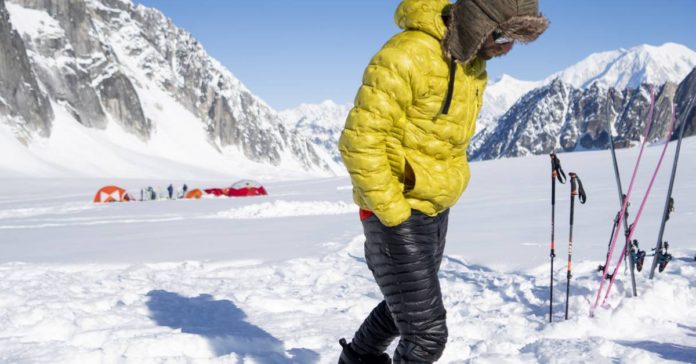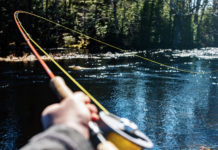Whether you’re camping on a glacier or just walking the dog, puffy pants are the duds you didn’t know you needed.
Puffy pants are a magical invention. We went out of our way, ventured into the cold, rolled around in the snow, and more to test the newest puffy pants on the market.
Check out two options from Mountain Hardwear, the Ghost Whisperer and the Stretchdown puffy pants, in our review below. And read on to learn why puffy pants deserve a place in your winter wardrobe. Trust us, your legs will thank you.
Why Puffy Pants?
Winter after winter, I’ve layered like Mike Wazowski, the cycloptic tennis ball from “Monsters, Inc.” — you know, all torso, no legs.
Before hitting the resort or splitboarding in the backcountry, I carefully chose base, mid, and outer upper layers based on the forecast. The bulk of my pre-adventure internal dialogue centered around which puffy to bring.
Should I wear the crispy 800-fill down jacket? A more breathable synthetic hoodie? A trashed yet beloved Patagonia puffy that I don’t mind ripping if we have to bushwhack? Any one of us who has bundled up for winter knows what I mean by the pitfalls of a Mike Wazowski layering system.
Honestly, I never gave much thought to my legs. Utterly neglected, the poor things. Give me base layer bottoms and shell pants, and I was good to go in any weather. On the coldest days, maybe, I’d rock a heavier base layer or a lightly insulated ski pant. If my legs got cold, I’d grit my teeth on the chairlift, ride harder, and try to warm up. In the backcountry, I’d just skin a little faster.
But as I got more into splitboarding, I unwisely tried to take this base layer and shell pant approach on winter camping missions. I’d just bring along fleece pants or spare long underwear for extra warmth in the evenings. But there’s a remarkable amount of downtime when you’re winter camping, and I spent much of it shivering. My otherwise overflowing gear closet proved lacking.
Insulating Your Legs: The Science
There’s a widespread assumption that the core is more prone to heat loss. But if the legs are freezing, you’re losing valuable body heat all the same. In fact, a 2016 study on heat loss reported that of 10 tested body parts — including the head, neck, abdomen, and more — radiation and convection heat losses are most acute in the thigh.
Granted, the lowest temperature in this study was a balmy 23 degrees Celsius (73.4 Fahrenheit) — a far cry from the biting subzero temperatures a winter camper encounters. But still, the point rings clear: legs get cold.
There’s a reason mountaineers wear down suits on 8,000m peaks. At best, focusing insulation primarily — or entirely — on the upper body is uncomfortable in extreme conditions. At worst, such oversight can be fatal.
Luckily for all of us Mike Wazowskis out there, there’s a simple solution: the puffy pant.
Mountain Hardwear Puffy Pants Review
No garment makes me want to compose poetry like the puffy pant. I won’t, don’t worry, but I want to. To the uninitiated, the puffy pant is a revelation — it’s a jacket for your legs, a sleeping bag you can walk around in.
People go winter camping for several foolish reasons — to climb mountains, ski couloirs, get to another destination, or just generally suffer. But my first and foremost motive for winter camping from here on out is to have an excuse to wear these Mountain Hardwear puffy pants.
Mountain Hardwear Ghost Whisperer Pant — Men’s & Women’s: Best for Comfort in Extreme Cold

If you’re familiar with the Mountain Hardwear Ghost Whisperer Jacket — which I’ve also tested and loved — you should have high expectations for the Ghost Whisperer Pant ($250). As expected, the specs are top-notch: 800-fill, RDS-certified down, a lightly water-resistant 15-denier ripstop nylon shell, and narrow, quilted baffles.
The lightweight pant sports two hand pockets, a zippered fly with a button snap, knee-high zips, and snaps at the ankle so you can rock it with boots or pull it on over low-profile footwear. (I had no problem with a slim splitboarding hardboot setup, but bulkier ski boots may still be difficult, as the knee isn’t super wide.)
For those worried about weight and pack space, the pant weighs a mere 10 ounces and packs into its own pocket.
I tested the Ghost Whisperer on a camping and splitboard mountaineering trip to Denali National Park’s Pika Glacier this past spring. I am 5’9” and 150 pounds, and I fit perfectly in a medium.
After long days of touring, I’d crawl into my tent, peel off my sweaty kit, and then throw these pants on. This ritual became sublime, as if the simple act of donning puffy pants transformed my Mountain Hardwear Trango 3 Tent into a 5-star luxury hotel. The hard part of the day was over, and it was time to get comfy, grab a beer, and chill.
Whether I was hanging in the cook tent, gathering snow to melt for water, or walking to the latrine, my legs never felt cold. In fact, the opposite was true. A couple of times throughout the trip I had to change out of these to cool off. That said, temperatures rarely dropped below 20 degrees F during our trip.
In more gnarly conditions, I can even see myself wanting a burlier pair of down pants like the Western Mountaineering Flight Pants.
Check Men’s Price at REICheck Men’s Price at BackcountryCheck Women’s Price at Mountain Hardwear
Mountain Hardwear Stretchdown Puffy Pant — Men’s & Women’s: Best for Casual Yet Active Pursuits

As the name suggests, the Mountain Hardwear Stretchdown technology seeks to pair the warmth of down with the mobility of more flexible fabrics. Instead of vertical or horizontal baffles, which limit the amount of stretch a garment has, Mountain Hardwear went with staggered pockets. These are stitched with 700-fill down into a stretchy 87% nylon and 13% elastane fabric.
The Stretchdown Pant ($250) is the latest addition to the brand’s puffy pant collection, and the tech seems tailor-made to the articulation required by active bottom layers. This pant fits well and moves better — like yoga pants and a down jacket had a baby. For less extreme conditions, maybe backcountry hut trips or long cabin stints, we see these pants as a great choice.
I ultimately chose to take the Ghost Whisperer to Alaska over the Stretchdown Pant, as it’s warmer. And, the Stretchdown pant doesn’t have ankle zips, making it difficult if not impossible to slip over boots. This felt like an oversight to me.
That said, I’ve since tested the Stretchdown Pant after frigid surfs in the Pacific Northwest, as well as fly fishing (under waders, of course), and spending nights out under the stars in the Sierras. The flexibility of the fabric makes the Stretchdown preferable if movement is in the cards, like hut-to-hut trips or traversing through cold, alpine terrain. And the Stretchdown’s much slicker style-wise.
Despite the benefits of the stretch, the lack of zips makes the Stretchdown more of a go-to for casual pursuits.
Check Men’s Price at evoCheck Men’s Price at REICheck Women’s Price at evo
Puffy Pants: Not Just for Gnar
The more time I’ve spent testing both the Ghost Whisperer and the Stretchdown Pant, the more I end up making excuses to wear them outside of extreme winter scenarios. Chilly mornings in the van, fixing coffee at a campground, warming up at the crag, walking the dog before work, fishing a numbingly cold river — all are perfect excuses to throw on puffy pants.
The highest praise I can give any piece of clothing is that my partner does her best to try and steal it. And as summer fades to fall, I find her wearing the Ghost Whisperer or Stretchdown Pants almost every morning, curled up in her favorite chair with a mug of tea.

When winter comes and I plan to employ these pants more regularly, I fear I may have to hide them.
If that isn’t a testament to the coziness of puffy pants, I’m not sure what is.
Credit: Source link

































